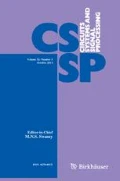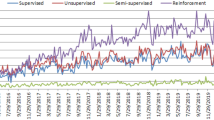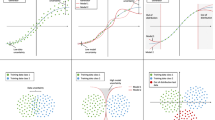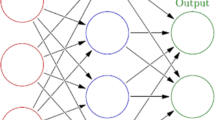Abstract
Decentralized mobile user communications rely on sensing and signal processing that are aided by fusion centers. Device-to-device (D2D) communications form the backend network for facilitating mobile user communication through the appropriate signal sensing and channel selection. The sensing and processing of tightly coupled channels ensure seamless uninterrupted communications with fewer outages. An imbalance in channel allocation and selection increases the gap between communication networks and signal processing systems. Unattended channel allocation and selection result in delayed communications and additional power exploitation with less reliability. This paper introduces an intelligence-based recurrent learning (IRL) scheme for optimal channel allocation and selection for mobile users’ D2D communication. The objective of this paper is to select a delay-controlled channel satisfying both the data rate and power control requirements in the channel allocation. The allocated channel is analyzed through a responsive linear system transformation for its power, data rate, and time constraints in a recurrent manner. The intelligent learning technique evaluates the consistency of the channel based on a recurrent analysis. The outcome of the analysis is the selection of an optimal channel from the allocated channels that satisfies the objective and channel policies. Synchronized channel allocation achieves power-controlled communications in a cooperative manner under controlled interference. The proposed IRL minimizes D2D communication delay, transmits the power requirement and outage, and improves throughput with better reliability.











Similar content being viewed by others
References
N. Abbas, H. Hajj, S. Sharafeddine, Z. Dawy, Traffic offloading with channel allocation in cache-enabled ultra-dense wireless networks. IEEE Trans. Veh. Technol. 67(9), 8723–8737 (2018)
D.C. Abrahão, F.H.T. Vieira, Resource allocation algorithm for LTE networks using fuzzy based adaptive priority and effective bandwidth estimation. Wirel. Netw. 24(2), 423–437 (2016)
M. Agiwal, A. Roy, N. Saxena, Next generation 5G wireless networks: a comprehensive survey. IEEE Commun. Surv. Tutor. 18(3), 1617–1655 (2016)
M. Ahmed, X. Kong, L. Liu, F. Xia, S. Abolfazli, Z. Sanaei, A. Tolba, BoDMaS: bio-inspired selfishness detection and mitigation in data management for ad hoc social networks. Ad Hoc Netw. 55, 119–131 (2017)
O. AlFarraj, A. AlZubi, A. Tolba, Trust-based neighbor selection using activation function for secure routing in wireless sensor networks. J. Ambient Intell. Humaniz. Comput. (2018). https://doi.org/10.1007/s12652-018-0885-1
R.P. Antonioli, E.B. Rodrigues, T.F. Maciel, D.A. Sousa, F.R.P. Cavalcanti, Adaptive resource allocation framework for user satisfaction maximization in multi-service wireless networks. Telecommun. Syst. 68(2), 259–275 (2017)
X. Bai, F. Zhang, J. Hou, F. Xia, A. Tolba, E. Elashkar, Implicit multi-feature learning for dynamic time series prediction of the impact of institutions. IEEE Access 5, 16372–16382 (2017)
I. Baştürk, B. Özbek, Channel and queue aware joint relay selection and resource allocation for MISO-OFDMA based user-relay assisted cellular networks. Telecommun. Syst. 67(4), 619–633 (2017)
W. Cheng, X. Zhang, H. Zhang, Optimal power allocation with statistical QoS provisioning for D2D and cellular communications over underlaying wireless networks. IEEE J. Sel. Areas Commun. 34(1), 151–162 (2016)
W. Ejaz, M. Ibnkahla, Multiband spectrum sensing and resource allocation for IoT in cognitive 5G networks. IEEE Internet Things J. 5(1), 150–163 (2018)
P. Gandotra, R.K. Jha, Device-to-device communication in cellular networks: a survey. J. Netw. Comput. Appl. 71, 99–117 (2016)
G. Gong, H. Liu, J. Liu, X. Fan, K. Liu, Q. Ma, X. Ji, Channel-aware rate adaptation for backscatter networks. IEEE/ACM Trans. Netw. 26(2), 751–764 (2018)
W. Gui, H. Huang, Y. Song, H. Sari, Deep learning for an effective nonorthogonal multiple access scheme. IEEE Trans. Veh. Technol. 67(9), 8440–8450 (2018)
M. Islam, M.A. Razzaque, M. Mamun-Or-Rashid, M.M. Hassan, A. Alelaiwi, A. Alamri, Traffic engineering in cognitive mesh networks: joint link-channel selection and power allocation. Comput. Commun. 116, 212–224 (2018)
M.G. Khoshkholgh, Y. Zhang, K.-C. Chen, K.G. Shin, S. Gjessing, Connectivity of cognitive device-to-device communications underlying cellular networks. IEEE J. Sel. Areas Commun. 33(1), 81–99 (2015)
H. Liu, X. Bai, Z. Yang, A. Tolba, F. Xia, Trust-aware recommendation for improving aggregate diversity. New Rev. Hypermedia Multimed 21(3–4), 242–258 (2015)
A. Rahim, K. Ma, W. Zhao, A. Tolba, Z. Al-Makhadmeh, F. Xia, Cooperative data forwarding based on crowdsourcing in vehicular social networks. Pervasive Mob. Comput. (2018). https://doi.org/10.1016/j.pmcj.2018.09.006
A.H. Sakr, H. Tabassum, E. Hossain, D.I. Kim, Cognitive spectrum access in device-to-device-enabled cellular networks. IEEE Commun. Mag. 53(7), 126–133 (2015)
M. Shokrnezhad, S. Khorsandi, Joint power control and channel assignment in uplink IoT networks: a non-cooperative game and auction based approach. Comput. Commun. 118, 1–13 (2018)
A. Tolba, E. Elashkar, Soft computing approaches based bookmark selection and clustering techniques for social tagging systems. Cluster Comput. (2018). https://doi.org/10.1007/s10586-018-2014-5
W. Wang, X. Wu, L. Xie, S. Lu, Joint storage assignment for D2D offloading systems. Comput. Commun. 83, 45–55 (2016)
Z.H. Wei, B.-J. Hu, A fair multi-channel assignment algorithm with practical implementation in distributed cognitive radio networks. IEEE Access 6, 14255–14267 (2018)
F. Xia, H.B. Liaqat, A.M. Ahmed, L. Liu, J. Ma, R. Huang, A. Tolba, User popularity-based packet scheduling for congestion control in ad-hoc social networks. J. Comput. Syst. Sci. 82, 93–112 (2016)
J. Xu, C. Guo, J. Yang, Bio-inspired power control and channel allocation for cellular networks with D2D communications. Wirel. Netw. (2018). https://doi.org/10.1007/s11276-018-1728-x
J. Xu, C. Guo, H. Zhang, Joint channel allocation and power control based on PSO for cellular networks with D2D communications. Comput. Netw. 133, 104–119 (2018)
K. Yang, S. Martin, C. Xing, J. Wu, R. Fan, Energy-efficient power control for device-to-device communications. IEEE J. Sel. Areas Commun. 34(12), 3208–3220 (2016)
C.H. Yu, K. Doppler, C.B. Ribeiro, O. Tirkkonen, Resource sharing optimization for device-to-device communication underlaying cellular networks. IEEE Trans. Wirel. Commun. 10(8), 2752–2763 (2010)
Acknowledgements
The authors extend their appreciation to the Deanship of Scientific Research at King Saud University for funding this work through research group No. RG-1439-088.
Author information
Authors and Affiliations
Corresponding author
Additional information
Publisher’s Note
Springer Nature remains neutral with regard to jurisdictional claims in published maps and institutional affiliations.
Rights and permissions
About this article
Cite this article
Al-Makhadmeh, Z., Tolba, A. An Intelligence-Based Recurrent Learning Scheme for Optimal Channel Allocation and Selection in Device-to-Device Communications. Circuits Syst Signal Process 39, 997–1018 (2020). https://doi.org/10.1007/s00034-019-01056-7
Received:
Revised:
Accepted:
Published:
Issue Date:
DOI: https://doi.org/10.1007/s00034-019-01056-7




